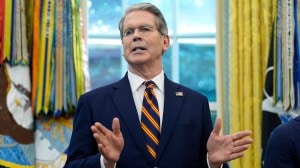Free at last, as per the script
Twelve years have gone by since Aung San Suu Kyi led Myanmar’s National League for Democracy to a landslide electoral victory in genera...

Twelve years have gone by since Aung San Suu Kyi led Myanmar’s National League for Democracy to a landslide electoral victory in general elections that were held after nearly three decades. She had won that election with 82 % of the vote. After the successors to General Ne Win who controlled the government refused to hand over power to her, she spent the last 12 years more or less under house arrest, except for a brief period between 1995 and 1998 when she was freed but was not allowed any political activity. She was released from house arrest by the military President of Myanmar General Than Shwe Chairman of the Peace and Development Council of Myanmar (as the Government of Myanmar is known.)
Suu Kyi’s release was the result of nearly 18 months of negotiations between her and representatives of the military government of the country since the end of 2000. The factors which led to her being set at liberty are: first and foremost, the family members and close military associates of former military President General Ne Win losing their dominant influence in the government over the last three years. Secondly, the incumbency factor seems to have affected the present military leadership and the Government, who concluded that unless they came to some understanding with the NLD and Suu Kyi, their control over the rank and file of the armed forces itself might diminish. Suu Kyi’s popularity has only increased over the years in Myanmar’s civil society, which would without doubt have impacted on the lower ranks of Myanmar’s army.
Thirdly, since becoming a member of ASEAN in the middle of the last decade, Myanmar has been under incremental pressure from other members to move towards democratic rule. Fourth, the most important factor is the critical state of Myanmar’s economy, which requires urgent external assistance and inputs.
The Burmese currency Kyat is now valued at 1,000 Kyat to a US dollar. Inflation rate in the economy is 70 %. Foreign Investment in Myanmar has come to a stand still. In fact, a few multinationals which were operating in Myanmar like Pepsi, have withdrawn from the country. The country’s economy is subject to sanctions by the US, multilateral financial organisations and the International Labour Organisation.
|
Suu Kyi’s release is partly because senior military aides of the ex-president were losing their influence in the Govt. Their control over the armed forces rank and file may have slipped because of her popularity
|
General Than Shwe realised the need to do something to restore Myanmar’s international credibility and acceptability. Despite some reticence and opposition from his seniormost military colleagues, the Army Chief of Staff General Maung Aye and Intelligence Chief General Khin Nyunt, he ordered the arrest of Ne Win and his family members early this March on the charge of planning a military coup of overthrow the government. This was a difficult decision which had to be underpinned by his gaining acceptability by the people of Myanmar and the rank and file of soldiers with their family links with Myanmerese civil society.
The anxiety that the military had about Suu Kyi weakening their authority by external influence generated by her husband of British origin also disappeared because he passed away a couple of years ago. The key to remain in authority, therefore, was to open up lines with Suu Kyi which would pacify domestic public opinion and create some international credibility because of the lady’s international stature as a Noble Laureate and charismatic advocate of democracy in the international community.
Despite receiving an enthusiastic mass welcome, Suu Kyi has not made any major pronouncements on her political plans or intentions since her release. She has only said that there are more positive prospects of a dialogue with the military regime to restore democracy in Myanmar. She has not defined any time-frame for fulfilling this objective.
The current indications based on pronouncements by the Than Shwe’s government and the scanty details available on the negotiations which preceded Suu Kyi’s release are that she has agreed not to make any immediate demands for elections or for the military giving up its power. She has apparently agreed to continue political dialogue with the regime to arrive at political compromises which would gradually lead to restoration of democracy in her country over a period perhaps of five years. There are even rumours than even after five years, the proposals would be for setting up of a government with more civilian representation, with the military still having a dominant role.
It is pertinent to touch upon Myanmar’s importance to India in this changed scenario. Myanmar’s strategic location at the Tri-Junction of India-Bangladesh and Sino-Bangladesh and Sino-Indian frontiers makes it an important geo-strategic area for the security of north-eastern parts of India. A cooperative relationship with Myanmar is important to overcome secessionist movements in the north-eastern regions of India. Given the competitive, if not confrontationist relationship between India and China, it is necessary for India to retain politico-strategic contacts with Myanmar in the context of China’s close and extensive political and defence relationship with the military regime in Myanmar. Myanmar is also a potential source for energy resources and a market for Indian goods, technology and joint ventures.
It is this reasoning which resulted in India developing an effective working relationship with the Than Shwe Government since 1992. While undertaking this exercise, the Indian government quietly stressed the need for restoration of democracy in that country with the military regime. But India did not join the bandwagon of public condemnation or tutorials on democracy undertaken by some western countries. India’s approach is very similar to that of important countries of South East Asia.
More recently, External Affairs Minister Jaswant Singh paid a very fruitful visit to Yangon as negotiations for the release of Suu Kyi were reaching their final stage.
Photos



- 01
- 02
- 03
- 04
- 05




























